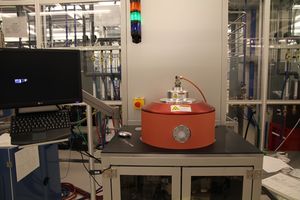PECVD 2 (Advanced Vacuum): Difference between revisions
Jump to navigation
Jump to search
(→Recipes & Historical Data: pasted process control data links) |
|||
| (19 intermediate revisions by 3 users not shown) | |||
| Line 1: | Line 1: | ||
{{ |
{{tool2|{{PAGENAME}} |
||
|picture=PECVD2.jpg |
|picture=PECVD2.jpg |
||
|type = Vacuum Deposition |
|type = Vacuum Deposition |
||
|super= |
|super= Michael Barreraz |
||
|super2= Don Freeborn |
|||
|phone=(805)839- |
|phone=(805)839-7975 |
||
|location=Bay 2 |
|location=Bay 2 |
||
|email=silva@ece.ucsb.edu |
|email=silva@ece.ucsb.edu |
||
|description = Vision 310 Advanced Vacuum PECVD |
|description = Vision 310 Advanced Vacuum PECVD |
||
|manufacturer = |
|manufacturer = Plasma-Therm |
||
|materials = |
|materials = |
||
|toolid=15 |
|toolid=15 |
||
| Line 13: | Line 14: | ||
==About== |
==About== |
||
This open-load system is dedicated to PECVD of SiO<sub>2</sub>, SiN<sub>x</sub>, SiO<sub>x</sub>N<sub>y</sub>, and a-Si using Silane (2%SiH<sub>4</sub>, 98% He), N<sub>2</sub>O, NH<sub>3</sub>, and N<sub>2</sub> gases |
*'''Films/Gases''': This open-load system is dedicated to PECVD of '''SiO<sub>2</sub>, SiN<sub>x</sub>, SiO<sub>x</sub>N<sub>y</sub>, and a-Si''' using Silane (2%SiH<sub>4</sub>, 98% He), N<sub>2</sub>O, NH<sub>3</sub>, and N<sub>2</sub> gases. |
||
*'''Size''': The sample electrode has a 270mm diameter useable area, allowing for multiple 4” wafer depositions in a single run. |
|||
*'''Temperature''': Standard operating temperature is 300C, but can be user changed for temps ranging anywhere from 250 to 350C. |
|||
== Recipes == |
|||
*'''Low-Stress Si<sub>3</sub>N<sub>4</sub>''': The system is equipped with a dual generator, dual frequency option for growth of Low-stress Nitride films. |
|||
**These films alternate between thin (<10nm) compressive and tensile layers. |
|||
| ⚫ | |||
**The Low-Stress Si3N4 film recipe are tested approx. monthly, and kept within ±100MPa. Data can be found at Recipes (below) > [[PECVD Recipes#Historical Data 5|Low-Stress Nitride]]. |
|||
| ⚫ | |||
| ⚫ | |||
| ⚫ | |||
==See Also== |
==See Also== |
||
| Line 26: | Line 25: | ||
*[http://www.advanced-vacuum.se/Ny-sida-8.html Vision 310 Product Page] |
*[http://www.advanced-vacuum.se/Ny-sida-8.html Vision 310 Product Page] |
||
== |
==Documentation== |
||
* |
|||
* |
|||
* |
|||
* |
|||
* |
|||
* |
|||
* |
|||
* |
|||
* |
|||
* |
|||
*[https://wiki.nanotech.ucsb.edu/w/images/2/2c/SOP_for_Advanced_Vacuum_PECVD.pdf Operating Instructions] |
|||
| ⚫ | |||
| ⚫ | |||
==Recipes & Historical Data== |
|||
| ⚫ | |||
| ⚫ | |||
**Thin-Films recorded: SiO2, Si3N4 and Low-Stress Si3N4 |
|||
| ⚫ | |||
| ⚫ | |||
===Process Control Data=== |
|||
*[https://docs.google.com/spreadsheets/d/1iSW1eAAg824y9PYYLG9aiaw53PEJ-f9ofylpVlCDq9Y/edit#gid=272916741 PECVD#2: Plots of all data] |
|||
* [[Operating Instructions]] |
|||
*[https://docs.google.com/spreadsheets/d/1iSW1eAAg824y9PYYLG9aiaw53PEJ-f9ofylpVlCDq9Y/edit#gid=1313651154 PECVD#2: SiO<sub>2</sub>] |
|||
| ⚫ | |||
*[https://docs.google.com/spreadsheets/d/1iSW1eAAg824y9PYYLG9aiaw53PEJ-f9ofylpVlCDq9Y/edit#gid=773875841 PECVD#2: Si<sub>3</sub>N<sub>4</sub>] |
|||
| ⚫ | |||
*[https://docs.google.com/spreadsheets/d/1iSW1eAAg824y9PYYLG9aiaw53PEJ-f9ofylpVlCDq9Y/edit#gid=584923738 PECVD#2: Low-Stress Si<sub>3</sub>N<sub>4</sub>] |
|||
**[https://docs.google.com/spreadsheets/d/1iSW1eAAg824y9PYYLG9aiaw53PEJ-f9ofylpVlCDq9Y/edit#gid=203400760 Plots of Low-Stress Si<sub>3</sub>N<sub>4</sub> Data] |
|||
Latest revision as of 20:09, 26 November 2024
| ||||||||||||||||||||||||||||||
About
- Films/Gases: This open-load system is dedicated to PECVD of SiO2, SiNx, SiOxNy, and a-Si using Silane (2%SiH4, 98% He), N2O, NH3, and N2 gases.
- Size: The sample electrode has a 270mm diameter useable area, allowing for multiple 4” wafer depositions in a single run.
- Temperature: Standard operating temperature is 300C, but can be user changed for temps ranging anywhere from 250 to 350C.
- Low-Stress Si3N4: The system is equipped with a dual generator, dual frequency option for growth of Low-stress Nitride films.
- These films alternate between thin (<10nm) compressive and tensile layers.
- The Low-Stress Si3N4 film recipe are tested approx. monthly, and kept within ±100MPa. Data can be found at Recipes (below) > Low-Stress Nitride.
See Also
Documentation
- Operating Instructions
- Wafer Coating Process Traveler
- For particle counting method, see the Surfscan Scanning Procedure
Recipes & Historical Data
- Recipes can be found on the PECVD Recipes Page:
- Recipes > Vacuum Deposition Recipes > PECVD Recipes > PECVD 2 - Advanced Vacuum
- Thin-Films recorded: SiO2, Si3N4 and Low-Stress Si3N4
- A list of all available deposited films can be found on the Vacuum Deposition Recipes page:
